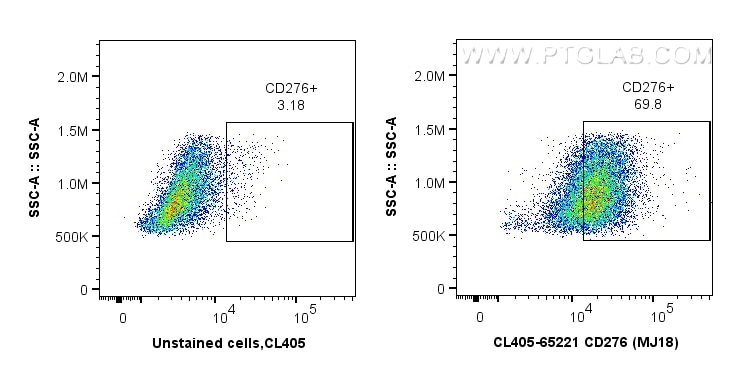Validation Data Gallery
Tested Applications
| Positive FC detected in | BALB/c mouse peritoneal macrophages |
Recommended dilution
| Application | Dilution |
|---|---|
| This reagent has been tested for flow cytometric analysis. It is recommended that this reagent should be titrated in each testing system to obtain optimal results. | |
| Sample-dependent, Check data in validation data gallery. | |
Product Information
CL405-65221 targets B7-H3/CD276 in FC applications and shows reactivity with mouse samples.
| Tested Reactivity | mouse |
| Host / Isotype | Rat / IgG1, kappa |
| Class | Monoclonal |
| Type | Antibody |
| Immunogen | Mouse IgG2a Fc-CD276 (aa 1-242) fusion protein 相同性解析による交差性が予測される生物種 |
| Full Name | CD276 antigen |
| GenBank accession number | BC019436 |
| Gene Symbol | Cd276 |
| Gene ID (NCBI) | 102657 |
| RRID | AB_3672392 |
| Conjugate | CoraLite® Plus 405 Fluorescent Dye |
| Excitation/Emission maxima wavelengths | 399 nm / 422 nm |
| Form | Liquid |
| Purification Method | Affinity purification |
| UNIPROT ID | Q8VE98 |
| Storage Buffer | PBS with 0.09% sodium azide. |
| Storage Conditions | Store at 2-8°C. Avoid exposure to light. Stable for one year after shipment. |
Background Information
CD276 (also known as B7-H3) is a type I transmembrane protein expressed on many tissues and cell types. CD276 is a 100-kDa glycoprotein that belongs to the B7 immunoregulatory family and participates in the regulation of T-cell-mediated immune response probably by functioning as both a T cell costimulator and coinhibitor (PMID: 25567370; 20696859). Overexpressed on a wide range of human solid cancers, CD276 has been implicated in cancer progression and metastasis and becomes an attractive target for cancer immunotherapy (PMID: 27208063).
Protocols
| Product Specific Protocols | |
|---|---|
| FC protocol for CL Plus 405 B7-H3/CD276 antibody CL405-65221 | Download protocol |
| Standard Protocols | |
|---|---|
| Click here to view our Standard Protocols |
